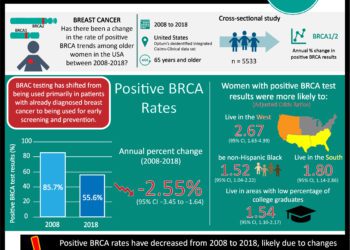Maintenance olaparib, compared with placebo, reduces the risk of disease progression in patients with advanced BRCA mutation ovarian cancer
1. Median progression-free survival was 56.0 months in the olaparib group and was 13.8 months in the placebo group.
2. 5-year progression-free survival was 48% in the olaparib group and 21% in the placebo group.
Evidence Rating Level: 1 (Excellent)
Study Rundown: Newly diagnosed advanced ovarian cancer has a high likelihood of relapse and associated mortality as a result. New treatments are needed in order to prolong survival in these patients. Olaparib is a poly(ADP-ribose) polymerase (PARP) inhibitor and tumour-cells with BRCA mutations are incapable of repairing DNA damage secondary to PARP inhibition, thereby leading to tumour-cell death. This study describes the outcomes on progression-free survival (PFS), 5 year PFS, and safety of olaparib as compared to placebo in patients with advanced ovarian cancer who had previously responded to platinum-based chemotherapy. Median PFS in the olaparib group was 56.0 months and in the placebo group, it was 13.8 months. PFS at 5 years was 21% in the placebo group and 48% in the olaparib group. Safety was assessed in every patient that received study treatment (either placebo or drug). 21% of patients in the olaparib group experienced serious adverse events (AEs) while 13% did in the placebo group. The most common serious AEs were anemia, neutropenia, and fatigue. One limitation of this study is the requirement for patients to have had either partial or complete response to previous chemotherapy. The results from this are therefore not applicable to patients who did not respond to initial treatment. Overall, olaparib is a potential maintenance treatment option for patients with newly diagnosed advanced ovarian cancer.
Click to read the study in Lancet Oncol
Relevant Reading: Maintenance Olaparib in Patients with Newly Diagnosed Advanced Ovarian Cancer
In-Depth [randomized controlled trial]: This phase 3, double-blinded and randomized control trial was conducted across multiple centres in 15 countries. 391 patients were randomly assigned by 2:1 allocation to receive either olaparib (n=260) or placebo (n=131); one placebo-assigned patient withdrew prior to study start. Criteria for eligibility included adult patients with a new diagnosis of advanced endometrioid ovarian cancer with a BRCA1 and/or 2 mutation that had partially or completely responded to previous platinum-based chemotherapy, and were expected to live at least 16 weeks. The impact on PFS, 5-year PFS, and safety of olaparib compared to placebo were described. Median PFS on olaparib was 56.0 months (95% confidence interval (CI), 41.9 months – not reached) as compared to 13.8 months on placebo (95% CI, 11.1-18.2 months) (hazard ratio (HR) 0.33 (95% CI, 0.25-0.43). PFS at 5 years was 21% (95% CI, 14-28%) in the placebo group and 48% (95% CI, 41-55%) in the olaparib group. PFS benefit of olaparib was consistent between both higher- and lower-risk subgroups. Each patient that received a dose of olaparib or placebo was assessed for AEs. Serious AEs were recorded in 21% of patients in the olaparib group and 13% of the placebo group. Anemia, neutropenia, and fatigue were the most common. Anemia was the most common AE due to treatment; 7% of the olaparib and 0% of the placebo group were affected. Dose interruption or reduction was preferable to discontinuation for managing AEs.
Image: PD
©2021 2 Minute Medicine, Inc. All rights reserved. No works may be reproduced without expressed written consent from 2 Minute Medicine, Inc. Inquire about licensing here. No article should be construed as medical advice and is not intended as such by the authors or by 2 Minute Medicine, Inc.







